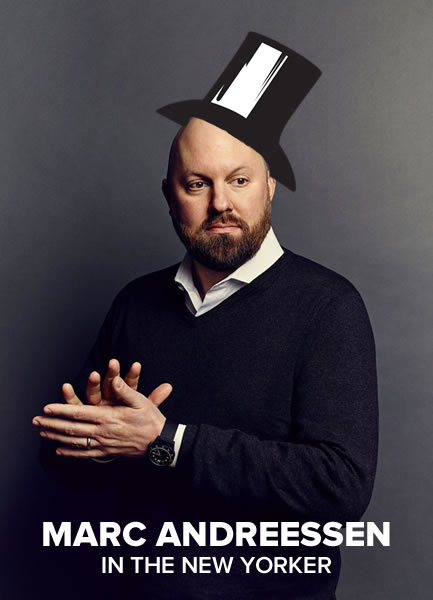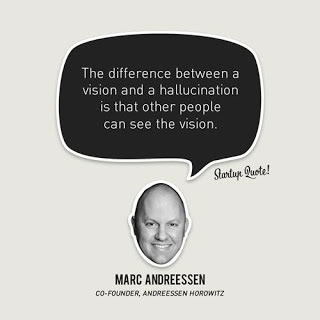Click the photo to read Marc’s profile in The New Yorker.
My Marc Andreessen regret
I have only a few regrets in my colorful career, and one of them not figuring out a way to turn the time Marc Andreessen reached out to me into something bigger.
In the fall of 2005, when I was just about to get married for the first time, I received an email from a “pmarca” from a domain I’d never heard of before. In the body, some guy claiming to be Marc Andreessen said that he was looking for a developer evangelist for a new company that was still in stealth mode. I initially dismissed it as a prank, but then thought better of it, and soon discovered that yes, it was the Marc Andreessen, and that company turned out to be Ning. A few email back-and-forths turned into a fantastic and fun phone interview with Gina Bianchini (Ning’s co-founder, and now entrepreneur in residence at Andreessen Horowitz) about becoming their North American developer relations guy, which included the possibility of moving to California to help them out with their venture.
A couple of weeks later, the possibility of that job had diminished greatly, as Marc and Gina had to get their burn rate under control. Marc suggested that I could take on the task of writing some example Ning apps, but I had so much going on between my job at Tucows and being newly-married to a wife who’d just moved to town and knew almost nobody. I figured that I didn’t have the bandwidth for the extra work — at least not without compromising the then-current job or the marriage. Those of you who know me know that the Tucows position is several jobs ago, and I’m now married to someone else, and every now and again, I kick myself for not finding a way to stay in the back of Marc’s mind for his later efforts.
Takeaways from Marc’s profile in The New Yorker, Tomorrow’s Advance Man
Found at OnePowerfulWord.com. Click the picture to see the source.
The May 18, 2015 edition of The New Yorker features Tomorrow’s Advance Man, a profile of Marc Andreessen that also provides a look into his venture capitalist firm Andreessen Horowitz, VCs in general, and the money that stokes the machinery of Silicon Valley.
A quick cut/paste/save/wc says that it weighs in at a hefty 13,442 words and 67 minutes’ reading according to Read-O-Meter. Don’t let the tl;dr demon scare you away; it’s a worthwhile read. Spread it out over a couple of lunches or coffee sessions if you need to, because there are some insights that you’ll find useful if you’re the tech industry (as most of this blog’s readers are).
My top takeaways from the article are:
- Don’t take it from me, take it from Kevin Kelly: “If you are going to deal with VCs, this profile of Marc Andreessen with fill in the blanks. Long but worth it.”
- I knew about Andreessen Horowitz’ short name for itself — a16z — derived from the fact that there are 16 letters between the starting “A” and the closing “z”. It borrows from the term i18n, which shortens the word internationalization in the same manner. What I didn’t know was the short name that A16z’s competitors preferred: AHo, as in “a-hole”.
- Want to get media attention? Be noisy on Twitter. Marc tweets more than 100 times a day because “Reporters are obsessed with it. It’s a like a tube and I have loudspeakers installed in every reporting cubicle around the world.” If you’d like to see examples, see A16z’s list of Marc’s top tweetstorms of 2014.
- Reading between the lines — a strength that many technically-oriented people lack, and even the most-people savvy forget how to do so in stressful situations — is doubly important when dealing with VCs. They speak euphemistically, often using understatement as a weapon, writes the article’s author, Tad Friend. “You’re definitely going to get funded!” means “But not by us.” “Who else is in?” means “Besides not us.” And “I’m not sure I would ever use your product myself” means “So long!”
- Marc grew up far from any major tech center, growing up in Wisconsin in an atmosphere of “antiquity, superstition, frustration, and penury”. Tad Friend writes that his vision of the future came from television, with Star Trek and the decidedly less cerebral (but still inspiring) Knight Rider. Even today, he still seems to get some inspiration from TV, as the references to the TV series Halt and Catch Fire, which Marc and Tad watched together, indicate.
- He’s an optimist who thinks big, and in order to get his attention, you’d better be ready to do the same: “We’re not funding Mother Teresa. We’re funding imperial, will-to-power people who want to crush their competition. Companies can only have a big impact on the world if they get big.”
- The real problems are never the technical ones. The people issues are always waaaay more complex.

